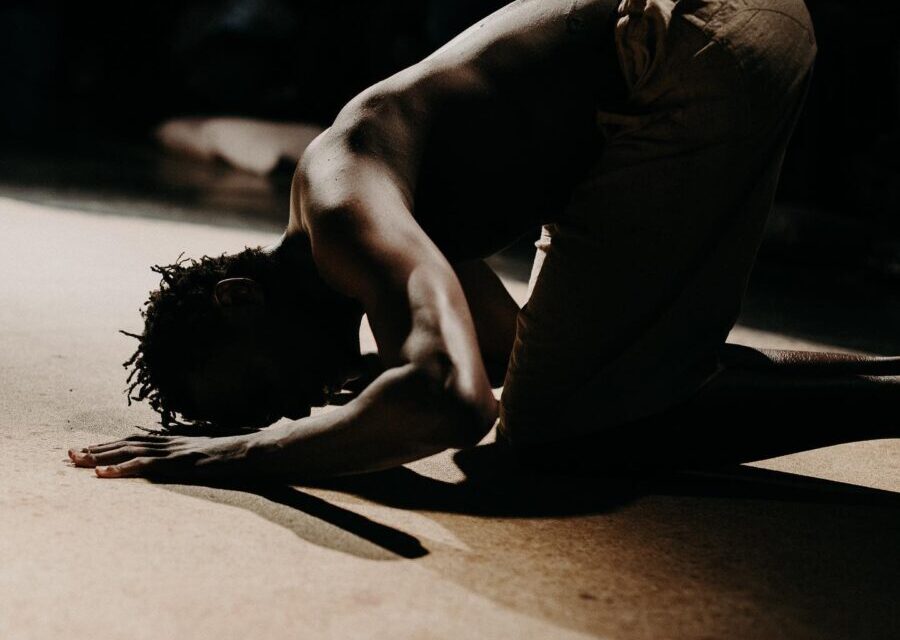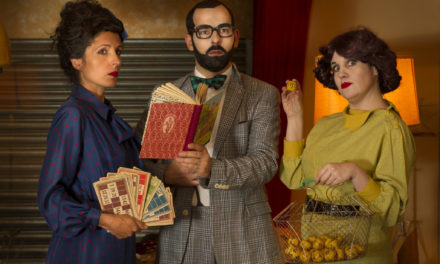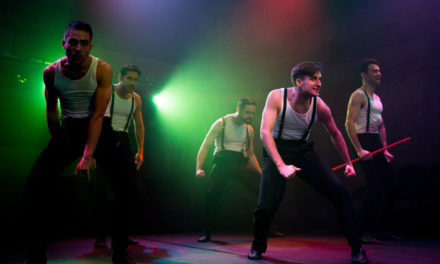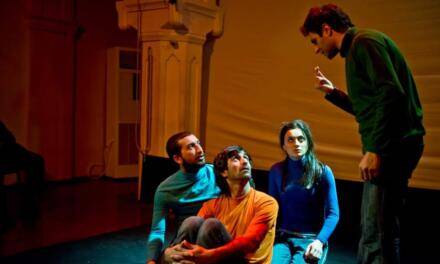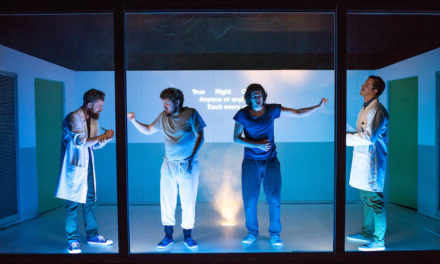John Rwoth-Omack is a Ugandan-born theatre artist, bred and based in the UK. A lover of African stories, he directed Bad Blood Blues for Sheffield Theatres, probing such disturbing questions as to why Africans are reduced to ‘guinea pigs’ for multinational pharmaceutical companies; and he was the assistant director for The Last King of Scotland, a stage adaptation of a novel on the subject of Idi Amin. Most recently, Rwoth has written and performed Far Gone, a haunting one-man’s play about the difficult choices taken by child soldiers embroiled in war. We recently dispatched an email across seas to bring us a word about his writing, ‘performing war’, and African theatre in the diaspora.
Q: It’s exciting to have you for this interview. It’s like tying the loose ends between theatre on the continent and in the diaspora.
A: Thank you, Ian, for having me. It’s been a long time coming. ‘Tying loose ends’, nice one! It’s a real challenge artists in the diaspora have – not to lose that traditional African essence. African theatre is just the best. I love the style, the connection between the audience and what’s happening on stage. I really hope to bring a hint of that to the diaspora. I may be based in the UK, but my heart is forever Ugandan.
Q: What do the recent Black-lives-matter protests in the US and elsewhere around the globe mean to you as an artist in exile (well, if you can accept the label) who certainly carries African consciousness?
A: Artist in exile, you really got me thinking there. Identity is such a complex thing. It gets even more complex when you feel you are part of two worlds. These protests really did make me think twice about my position in UK society. Firstly, as a young black man of African heritage that has now lived more than half his life in the UK. Do I just get up, uproot myself, and move back to Uganda? Or do I stay and fight? Of course, I can’t just leave. I have built a life here with families and friends, and professionally too. Is Ghana opening its doors to the diaspora, asking them to come back home the solution? I understand the thinking behind such activities. But then if we look at history, we, Africans were in our own continent minding our business when Andrew Livingstone turned up in the name of Queen Victoria and ‘discovered’ the continent. We have ever since been discriminated against and abused because of the color of our skin. Who is to say leaving is the solution? Most of our governments are still under Western powers. Don’t even get me started on China. If I am to head back to my motherland, it will be out of choice. It’ll be because it’s what I want to do and not because of racism. I guess that leaves with me the latter option of staying and fighting. What does that mean? To even begin to engage in that conversation, we need to understand the type of racism we have in the UK. It’s what I call colonial-style racism. It’s so subtle that the victim has to develop acute senses to source it out. It’s the racism of the mind. And it exists as a result of deliberate decisions made by the government over centuries to not teach all elements of the UK’s history. What is taught is a narrative of heroism, of greatness, ‘Great’ Britain. To truly fight racism in the UK, the education system needs to dramatically change. As an artist with African consciousness, I aim to do that by telling our forefathers’ stories, their contributions to the creation of the modern world, and highlight the points of history that shaped today’s western society. I actually have two or so projects lined up: one will look at the role Sub-Saharan African soldiers played in World War II, going the Allies’ way. The other tackles the history of racism against black people. The hope is to Educate, well, to try to. At least for the younger audiences, then I believe perceptions will change and therefore – hopefully – kill racism.

Q: Displacement and Migration: how does this tap into diasporic African theatre?
A: One of the biggest challenges of making African based theatre here, is getting an African audience. I’ve often wondered why. We love the theatre back home, but somehow when we cross the Indian Ocean our relationship with the theatre is entirely different. My theatrical debut was in primary school deep in the North, a place called Erussi. It was those school competitions I hope still happen in Uganda, and I loved it. I remember the town turning up not only to support us kids but genuinely to be entertained too. So what causes the disconnect between that apparent love we have for theatre back home? I personally think the answer lies in 1), the reason that migration happens in the first place; and 2), lack of representation of African culture and stories in the UK theatre scene.
Reasons we leave the motherland vary so much, from education to asylum, to family reunions. But one thing I found to be recurring among the diaspora is the importance of work. I have countless conversations with people of all ages. The idea of working hard to build a life back home, and eventually – maybe – going back. Where does someone in this position get time to even think about the theatre, especially when there is a 50-inch screen in their living room?
Lack of representation is mainly, I believe, due to the systemic racism the UK is steeped into. Firstly, there’s a poor representation of black people as a whole. African theatre is a minority within a minority. That’s why the few of us doing it need to do it justice. Well, I hope I do.
Q: Let’s turn to your play, Far Gone. Seeing you perform reads like journeying into the 1986-2006 LRA war in Northern Uganda. From the accent and enunciation of the Luo words, you come off as a native, you know, as someone who has been here long. For a performer based in the UK, one would want to know how you keep the truth and authenticity of such an African story on stage?
A: Hehe, yes. I am a proud Junam man from Pakwach and my mother is a strong Langi woman. I was lucky enough to grow up both in the North and Entebbe in Central Uganda, so I picked up Luganda as well as the mother tongue of Luo and Langi. I moved to Sheffield England when I was almost 12, even at such a young age, I knew I did not want to sound like I was from somewhere else but Uganda. I consciously made a decision to continue speaking my languages. Every time I was on the phone to Uganda, it was vernacular. I still try to keep it that way. It makes sense that I have a confused accent. Every other diaspora person I know who came to the UK around the same age as I did definitely sounds British. Those languages are such an important part of my identity and it’s highly pivotal to me that I don’t let them slip from my tongue. Far Gone being partly set in Northern Uganda, I really wanted to linguistically touch on that. It did help that I speak Luo.
Research is always at the center of all my work. Even if it’s a world I am familiar with, I still carry out the research as if I know absolutely nothing. I knew a bit about the LRA’s history but certainly not enough to write a play. My research, therefore, did have to look at the very beginning of the spirit of Lakwena. How Alice Auman became Alice Lakwena, how following Lakena’s guidance she created The Holy Spirit Movement which nearly overthrew Museveni’s government in 1986. How that very spirit was passed to Joseph Kony leading him to create The Lord’s Resistance Army. What was pivotal in research was also the culture of the specific part of Uganda we told the story from. And this is where language and spirituality played a big part.
Q: The drama itself has quite strong African performative aesthetics. The one man’s performer comes out as an omniscient narrator in African folklore especially as he mutates into different roles back and forth – as child soldiers, combatants, rebels. The fourth wall is also broken. In fact, the first line in the play is: ‘If I invited you to come with me on a journey, a story, will you come with me? Thank you.’ Why that choice?
A: Let me start by saying that, before I am an artist, I am an African… well, sub-Saharan African. And our style of storytelling is my personal favorite. Because it is so representative of its culture and people. We are fireplace storytellers. It is this informal style of storytelling that has been built into a theatrical professional institution. Folklore stories around the fireplace are narrated by one person. That very person will take on other roles and yet there’s so much room for others around the fireplace to participate, enabling the story to move forward. I saw Children Of Amazi, a wonderful play by a Burundi Theatre company at the Kampala International Theatre Festival. What I loved most about it was that there were other Burundians in the audience who immediately joined the cast in singing a familiar song. This is African Theatre to me. We tell stories about the people, for the people and with the people. Abantu. Even when we look at daily speech, political speakers, or religious sermons, there’s always this beautiful thing that I’ve noticed only in the sub-Saharan African culture, whereby a sentence is completed with a question to the audience, whoever that may be, one or 100 people. The answer is always obvious. But the audience is expected to answer it before the speaker proceeds. Something like: ‘In the beginning, God created the heavens and the…?’
Far Gone is an emotionally draining 65-minute journey, both for myself as the actor and for the audience. So as an actor I need the audience to help me push through the play. And as you are doing so, I also have your complete attention, you have no idea when I will bring you in. The audience by helping move the story forward are also complicit. So this idea of the fourth wall can’t exist.
Q: One of the elements that stand out in the play is thematic dualism. Think of loyalty and rebellion; kinship and alienation. It is war that splits the family; it is war that brings it together, albeit irreparably. There’s also revenge and retribution. When Okumu avenges his brother’s death, little does he know he is paying it with the life of another brother. What did you want to achieve with such interesting contrasts and coincidences?
A: When the idea first came to me, it was all about telling a story of a child soldier (Okumu) who is forced to kill his brother (Okello). The brother then comes back as a ghost to help Okumu navigate his way through the bush life of a child soldier. It, however, very quickly became clear to me and the director, Moji Eluwofu, that for this to truly work it needed to be a family story. To capture the whole LRA world, to get an audience that knows nothing about it to truly engage with what is transferred with one actor in 65 minutes, is near an impossibility. As a writer – with the help of dramaturge Paul Sirett – I then decided to make it about family but using the war as the catalyst.
We end up with a much more interesting story: a story not about the LRA, but rather about a family who is affected by the existence of the LRA. A much more relatable circumstance is omitted on stage. I would argue.
Q: In terms of style, Far Gone has Brechtian elements and ethos. Events run very fast in a seemingly deliberate attempt to condense tension and cathartic emotions. Dark scenes are played matter-of-factly. Was there a dramatic intention to domesticate the ghastly experience of war such as sexual assault, maiming, or murder of victims?
A: I think something that theatre gets wrong a lot of the time is this need to over-emphasize the horrors of war in the context of the characters’ lives. Wars last years, often decades. And in the lives of the children and the soldiers of the LRA, these aspects are part of everyday life. These are the things Okumu must learn fast, otherwise, he will be killed. So the horror of the piece and the events depicted need to be treated as matters of fact and we, like Okumu, are meant to be numbed by them. It’s like how we as an audience must be taught how to respond to the Commandant, and by the end of the play, it becomes automatic. The audience is no longer really processing it. They are numbly going along with what the Commandant says. Everything must be normalized so that it shows humanity being drained from both the characters and the audience. This for me carries so much more potency than trying to over-dramatize these aspects. Director Moji Elufowoju did an absolutely incredible job in allowing these elements to breathe freely in the play.
Q: African ghost lore often presents ghosts as the supernatural; not just people that have transitioned into the netherworld but rather living sentinels of knowledge, power, and truth. This is not the case with your ghost character. He, for instance, bays for the blood of Sprinkler and lures Okumu to kill him, but he should have known this is their brother. How do you explain this?
A: Yes, the ghost of Okello is, I think, quite intriguing and perhaps gives the play a new layer in comparison to other war/child soldier stories. Ghosts in the African context, like you’ve said, are normally all-knowing and spiritually, they are of good intentions. Especially if they are spirits of relatives, you know, traditionally we pray to our forefathers’ spirits.
I will admit that when I first had the idea of Okello coming back as a ghost, it was with these intentions in mind. The voice of reason and good. But I like breaking rules – theatre permits us to do that – to me, the most important thing is the service to the play. And for this particular ghost story, certain rules needed to be broken, but of course, still in keeping within the same traditional realm whilst twisting certain aspects of it.
Q: Far Gone played at Kampala International Theatre Festival (KITF) and in the UK. How do such uniquely diverse audiences receive the play, and what experiences do they bring to the performances?
A: The contrast here is fascinating and maybe not altogether surprising. Of course for the UK audience, perhaps around half may be familiar with the issues surrounding child soldiers, but a lot less will know specific examples. Of course, the Kony 2012 campaign shed some light on the horrors of the child soldiers, but we know how that campaign ended.
The audience is, therefore, brought into a world alien to them, and are presented with things they may well never have seen before, and given that the play’s power is often in the information or the insight it gives us into the world, it has often really shocked and moved western audiences.

In Kampala, there was of course this real homecoming that was both exciting, but also incredibly nerve-wracking, because the people do know about these issues, often first-hand so there was always a fear that the way things are represented on stage is going to be scrutinized and taken apart.
We opened at KITF to a standing ovation, which was incredibly humbling and was a really proud moment for me personally. I also met people after the play who had siblings taken by the LRA and receiving their praise meant a huge amount. The fact that the Kampala audience didn’t shy away from the participatory elements of the show demonstrates the resilience of a community that has suffered such trauma.
An article did come out not long after, not only lauding the play but also criticizing some aspects of the show and what they saw as an oversimplification of a complex problem. Which I suppose was inevitable, but of course, we can’t tailor every piece of theatre to suit every possible audience. I definitely don’t believe we oversimplified it, it is a highly complex situation and actually a lot of thought and skill from the creative team went into developing it and honoring the world of the play. It is also worth pointing out that one of the reasons I brought the play to life is that I escaped being kidnapped by the LRA myself when I was eight.
I do hope to bring the play back to Uganda one day, for a longer tour perhaps.
Q: If you were to live in any world of African drama, which character(s), would you be, and why?
A: This is not easy, we could be here for a while. If I had to choose one word, it would be that of Okot p’Bitek. From his Song Of Lawino to Modern Cookery. I just love his work and would actually like to turn them into plays one day.
Q: I am going to your home town next week. The girls may ask me: Ibu dugu awene pap : when is Rwoth coming back home? What should I tell them?
A: I wish you the best trip. Make sure you ask for malakwang. Tell them the prodigal son will return from exile one day, ready to tell or listen to stories. So, could they collect them, please?
Q: Many thanks for talking to us.
A: An absolute pleasure, Ian. And thank you to The African Theatre Magazine.
Before the lockdown in mid-March, John Rwoth-Omack‘s Far Gone was already on a tour around the UK. Considering the overwhelmingly beautiful feedback, with one reviewer describing it as ‘a fusion of sensibility, intelligence, and artistry’, one can only imagine the itchy anticipation with which audiences await the return of the play to the theatres in 2021.
This article was posted on theafricanmagazine.com on August 8, 2020, and was reposted with permission. To view the original article, click here.
This post was written by the author in their personal capacity.The opinions expressed in this article are the author’s own and do not reflect the view of The Theatre Times, their staff or collaborators.
This post was written by Ian Kiyingi Muddu.
The views expressed here belong to the author and do not necessarily reflect our views and opinions.

